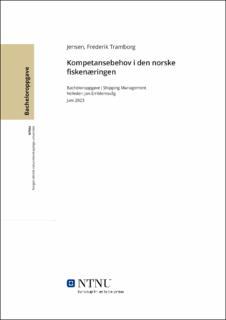| dc.contributor.advisor | Emblemsvåg, Jan | |
| dc.contributor.author | Jensen, Frederik Tramborg | |
| dc.date.accessioned | 2023-07-13T17:20:19Z | |
| dc.date.available | 2023-07-13T17:20:19Z | |
| dc.date.issued | 2023 | |
| dc.identifier | no.ntnu:inspera:146718144:50630735 | |
| dc.identifier.uri | https://hdl.handle.net/11250/3078722 | |
| dc.description.abstract | En maritim næring som det norske fiskeriet er, vil alltid ha et behov for sjøfolk som er kompetente innenfor deres yrkesfelt. Kompetansen sikrer trygg, effektiv og miljøvennlig drift av båtene, som er viktige faktorer for deres konkurranseevne i et internasjonalt marked.
Kompetansebehovet til de ulike fiskeselskapene påvirkes til enhver tid av omgivelsene. Hva mannskapet må være i stand til å gjøre, blir for eksempel påvirket av digitale og teknologiske løsninger som båtene innehar, med mål om å for eksempel effektivisere drift eller å tilfredsstille krav om miljøvennlig drift. Det vil derfor være interessant å se på hvilke kompetanser fiskenæringen har behov for på kort sikt og på lang sikt. Hva slags kompetanse er det allerede mangel på, og hvordan skulle man kunne oppnå tilfredsstillende kompetanse i næringen basert på det som er etterspurt i dag? Samtidig vil det være interessant å se på mulige faktorer som er med på å endre kompetansebehovet i fremtiden, og hvordan man kan omstille kompetansen deretter.
Her vil kompetansebegrepet bli forklart, sammen med innhenting av teori og data som gir uttrykk for hva fiskenæringen etterspør av kompetanse. Man vil også se på hva de ansvarlige myndighetene for utdanning ønsker å rette sitt fokus på, og hva næringen selv mener det burde fokuseres mest på.
Analysen viser at det er et betydelig udekket kompetansebehov i fiskenæringen, og mangelen stort sett omfatter personer med utdanning fra videregående- og fagskolenivåer, men også at det er mangel på spesialiserte kompetanser. Fiskenæringen forventer samtidig at kompetansebehovet vil fortsette å endre seg, og at det i fremtiden vil være større behov for kompetanse innen digitalisering. Utbedring av tilbudet for etter- og videreutdanning av den eksisterende arbeidskraften blir ansett som det mest hensiktsmessige tiltaket å gjennomføre når kompetansen må omstille seg hurtig. | |
| dc.description.abstract | A maritime industry such as the Norwegian fishing industry will always have a need for seafarers who are competent in their professional field. The expertise ensures safe, efficient and environmentally friendly operation of the boats, which are important factors for their competitiveness in an international market.
The competence needs of the various fishing companies are affected at all times by the environment. What the crew must be able to do is, for example, influenced by digital and technological solutions that the boats have, with the aim of, for example, making operations more efficient or meeting requirements for environmentally friendly operation. It will therefore be interesting to see what competences the fishing industry needs in the short term and in the long term. What kind of competence is there already a shortage of, and how could one achieve satisfactory competence in the industry based on what is in demand today? At the same time, it will be interesting to look at possible factors that help to change the need for competence in the future, and how competence can be adjusted accordingly.
Here, the concept of competence will be explained, together with the collection of theory and data that express what the fishing industry requires in terms of competence. One will also look at what the authorities responsible for education want to focus on, and what the industry itself believes should be focused on the most.
The analysis shows that there is a significant unmet need for competence in the fishing industry, and the shortage mostly includes people with education from upper secondary and vocational school levels, but also that there is a lack of specialized competences. At the same time, the fishing industry expects that the competence needs will continue to change, and that in the future there will be a greater need for competence in digitalisation. Improving the provision for continuing-education for the existing workforce is considered the most appropriate measure to implement when the competence must be changed quickly. | |
| dc.language | nob | |
| dc.publisher | NTNU | |
| dc.title | Kompetansebehov i den norske fiskenæringen | |
| dc.type | Bachelor thesis | |
